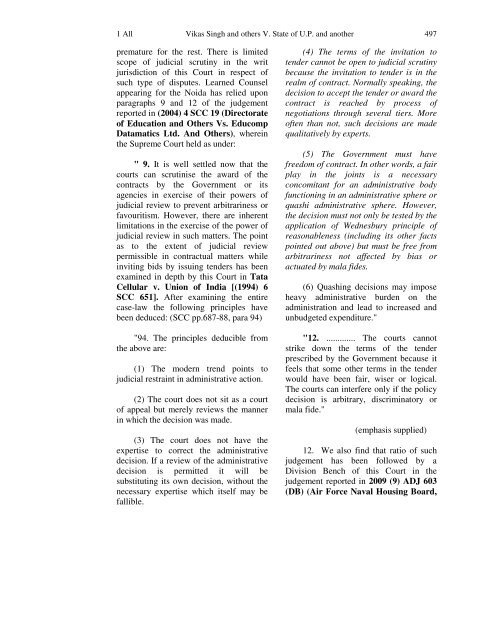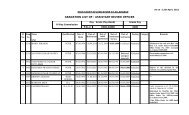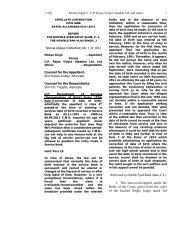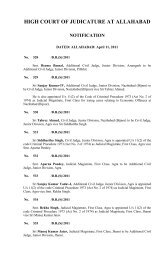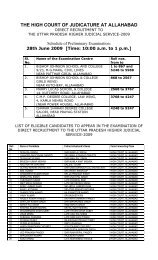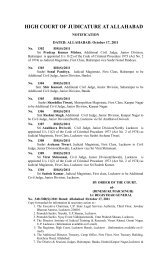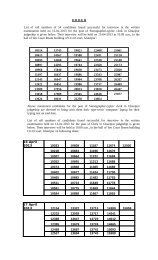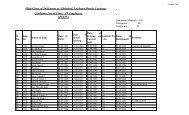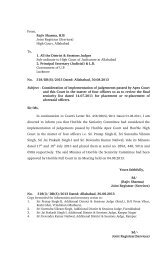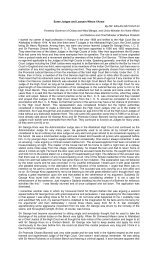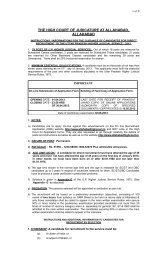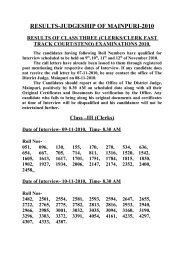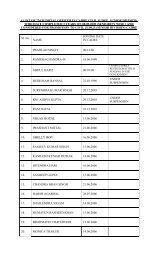Apr - High Court of Judicature at Allahabad
Apr - High Court of Judicature at Allahabad
Apr - High Court of Judicature at Allahabad
Create successful ePaper yourself
Turn your PDF publications into a flip-book with our unique Google optimized e-Paper software.
1 All Vikas Singh and others V. St<strong>at</strong>e <strong>of</strong> U.P. and another 497<br />
prem<strong>at</strong>ure for the rest. There is limited<br />
scope <strong>of</strong> judicial scrutiny in the writ<br />
jurisdiction <strong>of</strong> this <strong>Court</strong> in respect <strong>of</strong><br />
such type <strong>of</strong> disputes. Learned Counsel<br />
appearing for the Noida has relied upon<br />
paragraphs 9 and 12 <strong>of</strong> the judgement<br />
reported in (2004) 4 SCC 19 (Director<strong>at</strong>e<br />
<strong>of</strong> Educ<strong>at</strong>ion and Others Vs. Educomp<br />
D<strong>at</strong>am<strong>at</strong>ics Ltd. And Others), wherein<br />
the Supreme <strong>Court</strong> held as under:<br />
" 9. It is well settled now th<strong>at</strong> the<br />
courts can scrutinise the award <strong>of</strong> the<br />
contracts by the Government or its<br />
agencies in exercise <strong>of</strong> their powers <strong>of</strong><br />
judicial review to prevent arbitrariness or<br />
favouritism. However, there are inherent<br />
limit<strong>at</strong>ions in the exercise <strong>of</strong> the power <strong>of</strong><br />
judicial review in such m<strong>at</strong>ters. The point<br />
as to the extent <strong>of</strong> judicial review<br />
permissible in contractual m<strong>at</strong>ters while<br />
inviting bids by issuing tenders has been<br />
examined in depth by this <strong>Court</strong> in T<strong>at</strong>a<br />
Cellular v. Union <strong>of</strong> India [(1994) 6<br />
SCC 651]. After examining the entire<br />
case-law the following principles have<br />
been deduced: (SCC pp.687-88, para 94)<br />
"94. The principles deducible from<br />
the above are:<br />
(1) The modern trend points to<br />
judicial restraint in administr<strong>at</strong>ive action.<br />
(2) The court does not sit as a court<br />
<strong>of</strong> appeal but merely reviews the manner<br />
in which the decision was made.<br />
(3) The court does not have the<br />
expertise to correct the administr<strong>at</strong>ive<br />
decision. If a review <strong>of</strong> the administr<strong>at</strong>ive<br />
decision is permitted it will be<br />
substituting its own decision, without the<br />
necessary expertise which itself may be<br />
fallible.<br />
(4) The terms <strong>of</strong> the invit<strong>at</strong>ion to<br />
tender cannot be open to judicial scrutiny<br />
because the invit<strong>at</strong>ion to tender is in the<br />
realm <strong>of</strong> contract. Normally speaking, the<br />
decision to accept the tender or award the<br />
contract is reached by process <strong>of</strong><br />
negoti<strong>at</strong>ions through several tiers. More<br />
<strong>of</strong>ten than not, such decisions are made<br />
qualit<strong>at</strong>ively by experts.<br />
(5) The Government must have<br />
freedom <strong>of</strong> contract. In other words, a fair<br />
play in the joints is a necessary<br />
concomitant for an administr<strong>at</strong>ive body<br />
functioning in an administr<strong>at</strong>ive sphere or<br />
quashi administr<strong>at</strong>ive sphere. However,<br />
the decision must not only be tested by the<br />
applic<strong>at</strong>ion <strong>of</strong> Wednesbury principle <strong>of</strong><br />
reasonableness (including its other facts<br />
pointed out above) but must be free from<br />
arbitrariness not affected by bias or<br />
actu<strong>at</strong>ed by mala fides.<br />
(6) Quashing decisions may impose<br />
heavy administr<strong>at</strong>ive burden on the<br />
administr<strong>at</strong>ion and lead to increased and<br />
unbudgeted expenditure."<br />
"12. ............. The courts cannot<br />
strike down the terms <strong>of</strong> the tender<br />
prescribed by the Government because it<br />
feels th<strong>at</strong> some other terms in the tender<br />
would have been fair, wiser or logical.<br />
The courts can interfere only if the policy<br />
decision is arbitrary, discrimin<strong>at</strong>ory or<br />
mala fide."<br />
(emphasis supplied)<br />
12. We also find th<strong>at</strong> r<strong>at</strong>io <strong>of</strong> such<br />
judgement has been followed by a<br />
Division Bench <strong>of</strong> this <strong>Court</strong> in the<br />
judgement reported in 2009 (9) ADJ 603<br />
(DB) (Air Force Naval Housing Board,


